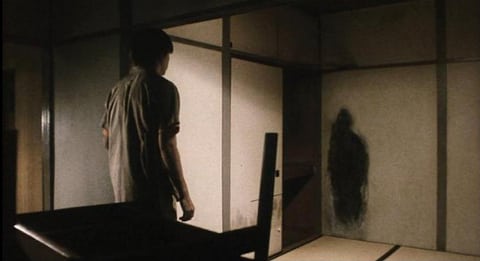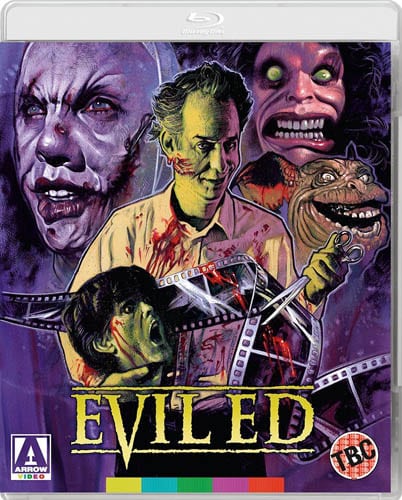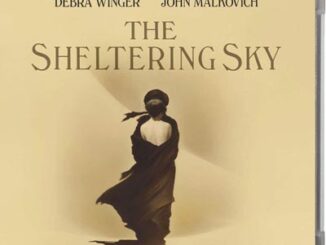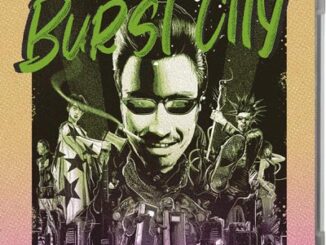Pulse (2001)
Directed by: Kiyoshi Kurosawa
Written by: Kiyoshi Kurosawa
Starring: Haruhiko Katô, Junko Sasano, Koyuki, Kumiko Asô
Japan
AKA KAIRO
AVAILABLE ON DUAL FORMAT BLU-RAY AND DVD: 1oth June, from ARROW VIDEO
RUNNING TIME: 118 mins
REVIEWED BY: Dr Lenera, Official HCF Critic
Two parallel stories which eventually join.
Plant shop employee Kudo Michi goes to visit co-worker Taguchi who’s been absent from work, only for him to hang himself, leaving behind a disc containing an image of Taguchi staring at his own computer monitor and, on the other monitor on his desk, a ghostly face staring out into Taguchi’s room. Work-mate Yabe then receives a mysterious phone call of a distorted voice repeatedly saying “Help me”.
Economics student Ryosuke, recently signed up to a new Internet Service Provider, finds his computer accesses a website by itself, showing him disturbing images of people alone in dark rooms, and a man with a plastic bag over his head. He attempts to bookmark, then print the images, but his computer will not follow his commands. Instead, a video plays of the man in the plastic bag standing in a room with the words “Help me” written all over the walls….
I hadn’t seen Pulse nor its American remake [which led to two sequels, the first of which was deemed so bad by our very own Ross Hughes that he couldn’t even give it half a star – he rated it ‘0’] prior to watching Arrow’s Blu-ray of the film, though me being me I have seen the 1988 American production of the same title about the intelligent pulse of electricity that terrosising the occupants of a house [ it’s better than it sounds]. I expected something rather like Ringu or The Eye and indeed that’s pretty much what I got for the first two thirds of the film. There’s nothing more pleasing to a horror fan when his or her horror juices begin to flow and he or she is genuinely frightened by a film, and Pulse certainly achieved that several times. Then – how shall I put it – stuff happens extremely quickly and the film changes into something a little different to before. As I type I can’t work out if this device entirely worked, partly because it seemed to make matters less scary for me personally, but one has to admire the audacity, and one thing that is followed through is the overriding theme of loneliness which is movingly portrayed. The film asks questions like can we ever truly connect with one another or are we doomed to be alone by our very natures? And it also shows how people may become distant islands and ghosts even through [and even maybe because of] connecting technology like cellphones and the internet, something common in films today but not so much then. Pulse is really an art-house essay on existentialism as well as a ghost story – but please don’t let that put you off!
After a moody opening few seconds on a boat, Pulse tells two coinciding stories which eventually join towards the end, and you sometimes have to keep on the ball as its probably possible to lose focus in a few places at the beginning until you get used to the cutting back and forth. Then again, if you haven’t seen Pulse than you probably already realise that its not really a crowdpleasing, fun, “Boo”-filled effort of the Conjuring school that you watch with a load of mates amidst lots of chuckles and jumps. Rather, it’s the kind of horror film that you’re better off watching alone in bed late at night with all the lights out, when you’re more up for concentrating and soaking up a strong atmosphere. Indeed the creepy feeling that director Kurosawa creates even in the early scene of one of our two main characters Michi going round to her absent workmate Taguchi’s house and, after luckily finding a hidden door key, going into the house, is masterful, aided by absolutely superb use of sound [is that distorted church bells I hear?] and music, plus some deliberately out of focus shots. The fool in me who sometimes just loves being scared and getting that rush all similarly-minded readers will recognise, was getting nicely wound up at this point. There’s a spooky darkened figure in the room nearly – oh it’s only Taguchi – but it’s not after that we get one of the most terrifying ghost moments I’d seen in some time, the spectre, half-shrouded in darkness, approaching somebody who hides behind a cupboard – only for some ghostly hands and then a face to slowly loom over the top. Splendid stuff!
So Taguchi hangs himself leaving behind images of himself and a ghostly face on his computer. Michi’s other workmates start to get odd phone calls and rooms sealed with red tape begin to pop up containing ghosts. Meanwhile, odd, unremovable images appear on Ryosuke’s computer when he gets a new ISP, and he becomes friends with co-student Harue who’s involved in researching a theory that souls have begun to invade the physical world, possibly because the afterlife is full [remember “when there’s no room in Hell…..” from Dawn Of The Dead?], and can even sometimes be seen around campus. It’s all incredibly creepy, KuRrosawa usually choosing to just place the camera down and then have things slowly emerge from the sides. Eventually Ryosuke and Harue decide to flee the city, and it’s here where the film changes and becomes more science-fictional. Just in case you haven’t seen it, I’m not going to give away much here as i would imagine many viewers will be pleasantly surprised. I can’t help but think that Kurosawa, who also wrote the screenplay, may have been better off developing and even explaining [it really is incredibly vague, not that that’s always a problem in itself] the earlier material and saved the latter part of what he was coming up with for a sequel. He also seems to be a little hampered by his budget towards the end.
However, the heavy element of sadness never goes away, nor the bleak look at human nature, the film certainly resisting the temptation to brighten things and therefore having a lot of conviction in this respect – well, except for a ridiculously upbeat and hopeful end credit song. The three main characters Michi, Ryosuke, Harue all seem isolated from society, almost ghosts, and Michi especially seems to be on the edge of life, desperately seeking friendships even though her boss says how fragile and even fraudulent friendships are. We’re also given the downright depressing thought that, if the afterlife does exist, it’s just a limbo where we’re as lonely as we may have been when we were alive, and that maybe ghosts are spirits just trying to make some kind of connection even though it’s now too late. The scene where a ghost explains that “death was eternal loneliness” almost brought tears to my eyes, and the film’s overall melancholy is as strong as Dark Water’s and carrying an even more relevant subtext, and yet Pulse never gets all pretentious in its commentary on human nature, a nature which is seemingly being eroded by technology. Nor does it seem angry – it’s the just the way things unfortunately are,according to Kurosawa. I found all this, and the way it was depicted, enormously compelling. Of course the downside to all this is that some may find it the film overly depressing, though I didn’t myself. More important is that Kurosawa sometimes seems more interested in the subtext and the symbolism than his story which doesn’t feel entirely worked out. Why does everyone mark ghost portals with red tape? Why does no one discuss the decreasing population? I like questions, but too many can result in an air of carelessness.
The briefly seen ghosts, just darkened actors, are more than good enough and different from the usual long haired girls, though it’s the unnerving sound effects that tell you that they’re nearby which often got to me more. One of the things I’ve enjoy about J Horror is how simplicity often rules, as well as the emphasis of mundane, cluttered interiors. Here, the design is mostly white or extremely pale [you could say death-like] colours with bits of red sticking out here and there. The camera tends to stay back, the majority of the film constructed from medium and long shots, clearly a deliberate device to help underlie its themes. There’s more use of music than usual for this kind of film, Takefumi Haketa’s superb score as good at evoking the melancholy as the frightful, though some may find it a bit over the top. I also found Kumiko Aso a little hammy in places but for the most part the performers suit the overall tone of the film and play their roles convincingly. I certainly can’t say that Pulse is anywhere near perfect, and it’s hard to love a film which is so darn bleak, more than anything else telling us that we are alone now and we will be alone forever, death makes no difference, loneliness is all there will be. But it ought to stick in the mind a fair bit after you’ve seen it. Yes, it’s a horror film, and it most definitely works as one – superbly at times – but it’s also an arty essay on existentialism. I can’t imagine the American remake even tries to be the same.
Rating: 









I personally wouldn’t say that the picture on this Blu-ray is top class, but then Dark Water didn’t look too great either so maybe the source materials for some of these Japanese horrors aren’t in great shape. It’s often a bit too soft and grain seems uneveningly dispersed, though it’s still probably better than the DVD and I wouldn’t call it actively poor, just average. Arrrow didn’t got a commentary done for this film but the selection of American and Japanese special features makes up for that. The hour long interview with Kurosawa Broken Circuits, which includes a few choice contributions from actor Show Aikawa [I have a feeling he thinks Kurosawa is a little mad], is really extensive and never less than interesting. He covers his early career and talks in depth about Pulse. He says that he thought the Japanese horror boom would die out so he crammed loads of old ideas into Pulse [which partly explains the randomness at times], and professes an admiration for the work of Tobe Hooper, and not just his most famous offering. Creepy Images is also surprisingly dense, cinematographer Junichiro Hayashi, sat at a bar with a glass of whisky and sometimes a cigarette, going into all sorts of stuff including some very interesting-sounding other films he worked on, and telling two amusing stories about the seemingly rather eccentric Kurosawa.
The Horror of Isolation featuring director Adam Wingard and writer Simon Barrett I was a little apprehensive about as I’m no fan whatsoever of Wingard’s work, but the two are great as they profess their admiration for the film. At one point they both say how watching rare films on poor quality discs of dubious legality at a time when that was the only way to see them was exciting and in a way made the films scarier. I agree, because I used to do the same thing! Then we have a 40-minute Japanese making-of that was on a DVD release and it’s very loose and fly-on-the-wall orientated, consisting largely of scenes being shot including some re-takes. My kind of documentary. Four similar featurettes cover more major scenes, and I definitely didn’t spot the CGI used in one death scene while I was watching the film. And finally we have some screening introductions from cast and crew members before the trailers and TV spots. Another very good release from Arrow of an occasionally difficult but fascinating and genuinely haunting movie.
SPECIAL EDITION CONTENTS:
*High Definition digital transfer
*High Definition Blu-ray (1080p) and Standard Definition DVD presentations
*Original 5.1 audio (DTS-HD on the Blu-ray)
*New optional English subtitle translation
*Broken Circuits: New interview with writer/director Kiyoshi Kurosawa
*Creepy Images: New interview with cinematographer Junichiro Hayashi
*The Horror of Isolation: a new video appreciation featuring Adam Wingard & Simon Barrett (Blair Witch, You’re Next)
*Archive ‘Making of’ documentary, plus four archive behind-the-scenes featurettes
*Premiere footage from the Cannes Film Festival
*Cast and crew introductions from opening day screenings in Tokyo
*Trailers and TV Spots
*Reversible sleeve featuring original and newly commissioned artwork by Tommy Pocket
FIRST PRESSING ONLY: Illustrated collector’s booklet featuring new writing on the film by critic Chuck Stephens








Be the first to comment